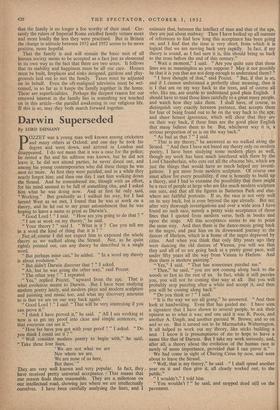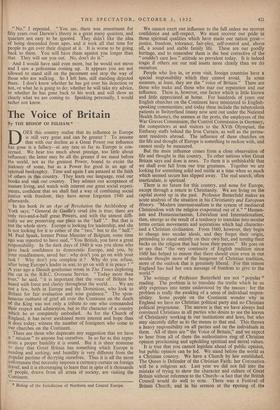Darwin Superseded
By LOAD DUNSANY pOZZET was a young man well known among cricketers and many others at Oxford; and one day he took his degree and went down, and arrived in London and disappeared. I do not mean that it was a case for the police; he rented a flat and his address was known, but he did not leave it, he did not attend parties, he never dined out, and among his young contemporaries who did these things he was seen no more. At first they were puzzled, and in a while they nearly forgot him; and then one day I met him walking down the Strand. And he remembered me, though with an effort, for his mind seemed to be full of something else, and I asked him what be was doing now. And at first he only said, " Working." But gradually as I walked his way, for I had turned West as we met, I found that he was at work on a theory, and he let out to my great astonishment that he was hoping to leave a name as great as Darwin's. ' Good Lord I " I said. ' How are you going to do that ? " " I am at work on my theory," he said. " Your theory ? " said I. " What is it ? Can you tell me in a word the kind of thing that it is ? " For of course I did not expect him to expound the whole theory as we walked along the Strand: Nor, as he quite rightly pointed out, can any theory be described in a single word.
" But perhaps mine can," he added. " In a word my theory is about evolution."
" But didn't Darwin discover that ? " I asked.
" Ah, but he was going the other way," said Pozzet. " The other way ? ' I repeated. . " Yes," replied Pozzet, ' upward from the ape. That is what evolution meant to Darwin. .But I have been studying modern poetry lately, and modern plays and modern sculpture and painting and music too; and what my discovery amounts to is that we are on our way back again." " Good Lord ! " I said. " That will be very interesting if you can prove it." " I think I have proved it," he said. ," All I am working at now is to get my proof into clear and simple sentences, so that everyone can see it."' " How far have you got with your proof ? " I asked. " Do you think I could see it ? " " Well consider modern poetry to begin with," he said; " Take these four lines, ' We are not what we are Nor where we are.
We are none of us here, But there.' " They are very well known and very popular. In fact, they have received pretty universal acceptance. That means that our reason finds them reasonable. They are a milestone on our intellectual road, showing just where we are intellectually ourselves. I have been carefully analysing the lines, and I estimate that, between the intellect of man and that of the ape, they are just about midway. Then I have looked up all manner of references to find how long this acceptance has been going on, and I find that the time is very short, from which it is logical that we are moving back very rapidly. In fact, if my theory is sound, as I feel sure it is, this should bring us back to the trees before the end of this century." " Wait a moment," I said. " Are you quite sure that those lines are as meaningless as you suppose ? May it not possibly be that it is you that are not deep enough to understand them? " I have thought of that," said Pozzet. " But, if that is so, and if I, cannot understand a perfectly clear meaning, then it is I that am on my way back to the trees, and of course all who, like me, are unable to understand good plain English. I should have to read those lines carefully to a great many people, and watch how they take them. I shall have, of course, to distinguish very exactly between pretence, that accepts them for fear of being found out to be on the way back to the ape, and sheer honest ignorance, which will show that they are on their way back, if these lines are the good plain English that mans' believe them to be. But, whichever way it is, a serious proportion of us is on the way back."
" As bad as that ? " I said.
" That is my theory," he answered as we walked along the Strand. " And then I have not based my theory only on modern poetry, I have been studying some modern plays as well, though my work has been much interfered with there by the Lord Chamberlain, who cuts out all the obscene bits, which are just the things that would have so much helped my investi- gations. I got more from modern sculpture. Of course one must allow for every possibility, if one is honestly to build up a theory, and I had to examine the possibility that there might be a race of people at large who are like much modern sculpture one sees, and that all the figures in Battersea Park and else- where are faithful portraits. If so, the race is not only well on its way back, but is even,beyond the ape already. But no; after very thorough investigations and over a wide area I have found no such race, merely a pretty wide acceptance of those lines that I quoted from modern verse, both in books and upon the stage. All this acceptance seems to me to point the same way. And then there is the dance-music going back to the negro, and past him on its downward journey to the dances of Harlem, which is a home of the negro depraved by cities. And when you think that only fifty years ago they were dancing the old dances of Vienna, you will see that they and all of us are going back at a pretty great pace, well under fifty years all the way from Vienna to Harlem. And then there is modern painting."
" Yes," I said. " That has sometimes puzzled me."
" Then," he said, " you are not coming along back to the woods so fast as the rest of us. In fact, while it still puzzles you, you will not be coming that way at all. But you will probably stop puzzling after a while and accept it, and then you will be coming along back."
" Do you think so ? " I said.
" It is the way we are all going," he answered. " And then look at handwriting. Even that has guided me. I have seen a signature that I have shown to several people, to ask their opinion as to what it was; and one said it was R. Poots, and another A. Umph, and another guessed W. Brown; and so on and so on. But it turned out to be Marmaduke Witherington. It all helped to work out my theory, like sticks building a nest. I know it is presumptuous of me to hope to leave a name like that of Darwin. But I take my work seriously, and, after all, a theory about the evolution of the human race is surely of some importance, provided that I can prove it." We had come in sight of Charing Cross by now, and were about to leave the Strand.
" Well, that is my theory," he said. " I shall spend another year on it and then give it, all clearly worked out, to the public."
" I wouldn't," I told him.
" You wouldn't ? " he said, and stopped dead still on the pavement. " No," I repeated. " You see, there was resentment for fifty years over Darwin's theory in a great many quarters, and quarters not easy to be ignored. They didn't like the idea of being descended from apes, and it took all that time for people to get over their disgust at it. It is worse to be going back to them. You will have them against you longer than that. They will see you out. No, don't do it."
And I would have said even more, but he would not move and I saw a policeman coming up. It appears you are not allowed to stand still on the pavement and stop the way of those who are walking. So I left him, still standing dejected there. I don't know whether he has got over his dejection or not, or what he is going to do; whether he will take my advice, or whether he has gone back to his work and will show us clearly what we are coming to. Speaking personally, I would rather not know.



















































 Previous page
Previous page